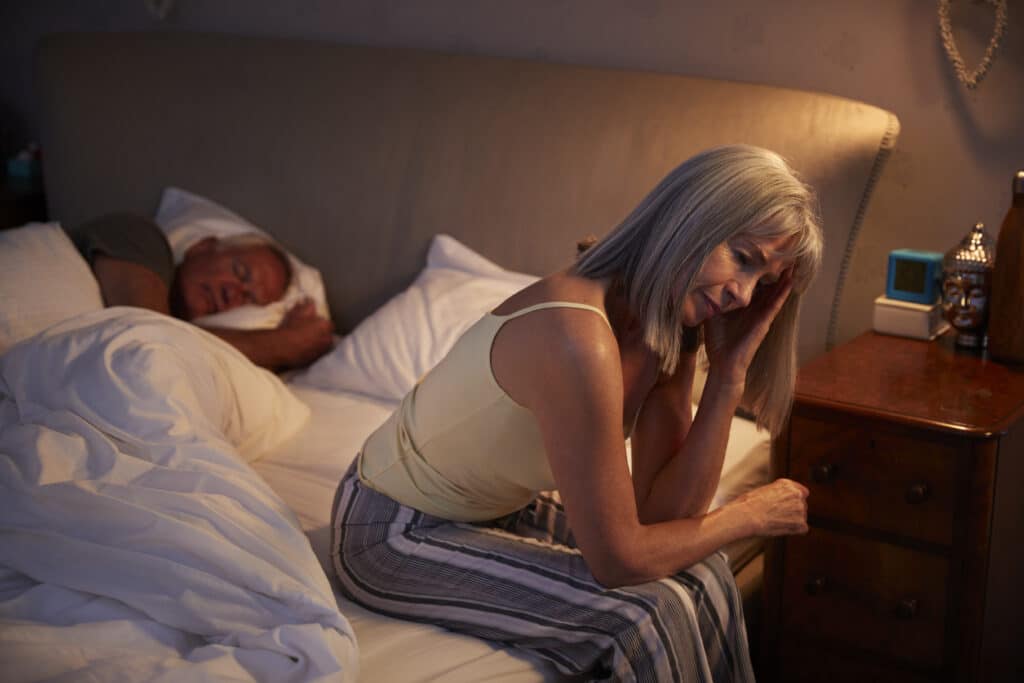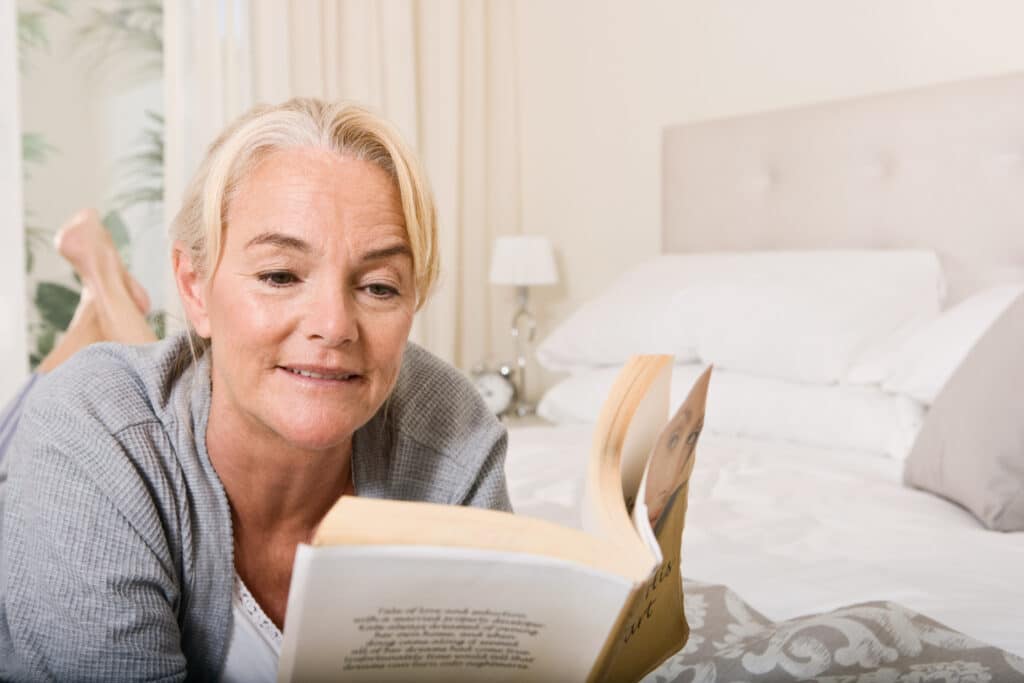Sleep-related issues are a frustrating problem for many women going through menopause.
Hormonal changes, especially the drop in estrogen and progesterone, can wreak havoc on your sleep patterns. These changes can lead to hot flashes, night sweats, and mood swings, all of which make it harder to get a good night’s rest.
Understanding these changes and knowing how to manage them can make a big difference. There are many ways to improve your sleep, from practicing good sleep hygiene to exploring therapies like CBT-I, or getting treated for related conditions like sleep apnea or restless leg syndrome.
This article will provide insight into regaining control of your sleep and feeling more rested and rejuvenated as you navigate menopause.
Hormonal Changes and Their Impact on Sleep
Hormonal changes are the primary reasons for sleep disturbances during menopause.
During menopause, the production of two pivotal hormones, estrogen and progesterone, significantly decreases. These hormones play a crucial role in regulating other hormones that govern sleep, such as melatonin.
- Estrogen plays a vital role in promoting deep, restorative sleep. It helps regulate the sleep-wake cycle and promotes REM (rapid eye movement) sleep, which is crucial for memory consolidation and mood regulation.
- Progesterone also contributes to sleep regulation. It has a calming effect on the brain, promoting relaxation and reducing anxiety.
The decrease in estrogen and progesterone levels can have profound effects on sleep regulation. Progesterone levels typically drop during menopause, which can lead to increased stress and difficulty falling asleep.
Estrogen and progesterone decline can also disrupt the body’s internal clock, leading to sleep irregularities and increased tiredness.
Other Side Effects of Hormone Disruption
The decrease in estrogen levels can lead to a series of cascading effects such as hot flashes, night sweats, and mood changes that further disrupt sleep.
Hot flashes can cause sudden and intense feelings of warmth, often leading to sudden awakenings during the night. Night sweats, on the other hand, can result in excessive sweating, discomfort, and the need to change bedding, further interrupting sleep and increasing time awake.1
Additionally, hormonal fluctuations during menopause can contribute to mood changes such as irritability, anxiety, and depression.
Cortisol, often referred to as the stress hormone, can become dysregulated during menopause and can cause stress, anxiety and difficulty sleeping. Increased stress and anxiety levels can further exacerbate difficulty in both falling and staying asleep, creating a cycle that can be challenging to break.
Although these changes in mood are common, they’re not inevitable. Numerous strategies and treatments are available to manage these symptoms and, in turn, improve sleep quality during menopause.
Let’s take a look at some of the most common sleep-related conditions and ways to manage them.
Managing Insomnia and Other Conditions During Menopause

One of the most common sleep disturbances during menopause is insomnia.
Insomnia is characterized by trouble falling or staying asleep, which can significantly impact daily life. Chronic insomnia can lead to fatigue, mood changes, and a decreased quality of life.
Many of the aforementioned menopause-related hormonal changes can trigger insomnia. It’s also essential to recognize that mental health conditions such as anxiety and depression (often associated with menopause) can make insomnia worse.
Cognitive Behavioral Therapy for Insomnia
Cognitive-behavioral therapy for insomnia (CBT-I) can be an effective approach. It involves changing your sleep habits and restructuring misconceptions about sleep and insomnia.
CBT-I typically includes several techniques, such as cognitive therapy, which helps identify and change beliefs that may be affecting sleep, and behavioral therapy, which focuses on changing behaviors that contribute to insomnia.3
One common technique used in CBT-I is stimulus control, which involves associating the bed and bedroom with sleep by limiting activities such as watching TV or using electronic devices in bed.
Additionally, relaxation techniques and strategies for managing anxiety and stress are often incorporated into CBT-I to promote better sleep quality and overall well-being.
Sleep Apnea and Menopause
One of the most common sleep disturbances during menopause is sleep apnea, a condition where breathing repeatedly stops and starts during sleep.
Sleep apnea can lead to fragmented sleep, daytime sleepiness, and if left untreated, serious health complications.
Sleep apnea is more prevalent in women after menopause for a few reasons.
The hormonal changes that occur during menopause, including a decrease in estrogen levels, are believed to contribute to the increased risk of sleep apnea.
Additionally, weight gain, which is common during menopause, can also increase the risk of developing sleep apnea.
Hormonal fluctuations and changes in body composition can lead to changes in upper airway anatomy, making women more susceptible to airway collapse during sleep.1
CPAP and Management Techniques
Fortunately, effective treatment options are available for sleep apnea. One common treatment is Continuous Positive Airway Pressure (CPAP) therapy.
CPAP therapy involves wearing a mask over your nose and/or mouth while you sleep to keep your airways open, allowing for uninterrupted breathing. This treatment can significantly improve sleep quality and reduce symptoms associated with sleep apnea.
In addition to CPAP therapy, adopting certain lifestyle changes can also be beneficial in managing sleep apnea.
For example, losing weight, if necessary, can help reduce the severity of sleep apnea symptoms.
Additionally, quitting smoking and avoiding alcohol close to bedtime can also help improve sleep apnea symptoms and overall sleep quality.
By combining CPAP therapy with lifestyle changes, individuals can effectively manage sleep apnea and improve their overall sleep health during menopause.
Restless Legs Syndrome
Restless Legs Syndrome (RLS) is a condition characterized by an irresistible urge to move your legs, often accompanied by uncomfortable sensations such as crawling, tingling, or burning feelings.
This condition can worsen during menopause and not only disrupt sleep but also affect your overall quality of life.
Hormonal changes during menopause may contribute to the worsening of RLS symptoms. Additionally, iron deficiency, which is common in menopausal women, can exacerbate RLS symptoms. The good news is that there are ways to manage RLS.
Managing RLS with Medication or Lifestyle Modifications
Medication and lifestyle changes can be effective in managing RLS symptoms.
Medications may be prescribed by your doctor to alleviate symptoms; these medications may include dopamine agonists, anticonvulsants, or opioids, depending on the severity of your symptoms.
Regular exercise, particularly activities that promote leg movement, such as walking or cycling, can help reduce symptoms. Limiting caffeine intake and avoiding alcohol and tobacco can also help alleviate RLS symptoms.
With the right combination of medication and lifestyle changes, you can effectively manage RLS and improve your overall sleep quality during menopause.
The Difference Between Temporary and Long-term Sleep Disruption
In my medical career, I’ve had many older patients express concerns about sleep problems as they age, particularly in relation to menopause.
It’s important to acknowledge that sleep disturbances during menopause are not a one-size-fits-all scenario. For many women, these disruptions are temporary, while for others, they can continue post-menopause.
Once again, hormonal instability during menopause has a primary impact on sleep quality. However, these hormonal imbalances often resolve post-menopause, improving sleep quality for most women.
But for some, the hormone fluctuations persist much longer, dragging out the length of the symptoms that come along with them.5
Furthermore, depression and/or anxiety that developed or worsened during menopause or increasingly high-stress levels may persist even when hormone levels have settled.
It’s important to understand that even if they last a little longer, these fluctuations and the symptoms that accompany them are not necessarily permanent issues. This natural cycle in women’s lives is highly individual and often influenced by a variety of factors.
Remember, it’s always best to consult a healthcare provider if you’re experiencing persistent sleep disturbances. They can guide you through managing these issues and help you get a diagnosis if necessary so you can finally get a good night’s sleep.
Alleviating Sleep Problems in Older Adults

Various strategies can help improve your sleep quality during and after menopause, from hormone therapy to lifestyle changes and even alternative therapies.
Practicing Good Sleep Hygiene
Practicing good sleep hygiene is essential for managing insomnia during menopause. Sleep hygiene involves adopting habits and behaviors that promote better sleep.
Some key strategies include maintaining a regular sleep schedule by going to bed and waking up at the same time every day, even on weekends.
Creating a comfortable sleep environment, which includes a cool, dark, and quiet bedroom, can also improve sleep quality. It’s essential to avoid stimulants such as caffeine and nicotine close to bedtime, as well as heavy meals and alcohol, which can disrupt sleep.4
Additionally, limiting exposure to electronic devices before bed and engaging in relaxing activities such as reading or taking a warm bath can help signal to your body that it’s time to wind down and prepare for sleep.
Incorporating these sleep hygiene practices into your nightly routine can promote better sleep and help manage insomnia during menopause.
Hormone Replacement Therapy (HRT): The Benefits and the Risks
Hormone Replacement Therapy (HRT) offers one solution for the relief of menopausal symptoms by restoring hormonal balance.
The benefits of HRT extend beyond improving sleep quality. They often also improve the occurrence of hot flashes and night sweats and enhance overall quality of life.
By replenishing declining estrogen and progesterone levels, HRT can effectively mitigate symptoms that disrupt sleep, providing women with much-needed relief during the menopausal transition.
However, the decision to undergo HRT requires careful consideration of its potential risks.
Long-term use of HRT, particularly estrogen-progestin therapy, has been associated with increased risks of breast cancer, heart disease, blood clots, and endometrial cancer.
Despite its effectiveness in managing menopausal symptoms, HRT may pose significant health risks, necessitating thorough discussions with healthcare providers to weigh the benefits against potential adverse effects.
Lifestyle Changes for Better Sleep
Regular exercise is a powerful tool for improving sleep quality, especially during menopause.
Studies have consistently shown that physical activity can significantly reduce menopausal symptoms, leading to better sleep.
Engaging in regular exercise not only promotes physical health but also has positive effects on mental well-being, reducing stress and anxiety, which can contribute to sleep disturbances.
The timing and type of exercise can also impact sleep. While any form of physical activity is beneficial, exercising earlier in the day may be more conducive to better sleep, as exercising close to bedtime can energize you and make it harder to fall asleep.
Incorporating a variety of exercises, including aerobic activities like walking or cycling, as well as strength training and flexibility exercises, can provide maximum benefits for sleep and overall health.
Alongside regular exercise, maintaining a healthy diet and managing your weight are also crucial for improving sleep quality. A well-balanced diet rich in fruits, vegetables, whole grains, and lean proteins can help regulate hormones.
As mentioned previously, avoiding heavy meals, caffeine, and alcohol close to bedtime can improve sleep quality. While it may be tempting to pour a ‘nightcap’ before bed, it may be doing more harm than good.
Key Takeaways
- Hormonal changes during menopause, especially the decrease in estrogen and progesterone, can lead to sleep disturbances.
- Estrogen and progesterone help regulate sleep by promoting deep sleep and reducing anxiety.
- Lower levels of these hormones can disrupt the body’s internal clock, leading to sleep irregularities.
- Symptoms like hot flashes and night sweats, caused by decreased estrogen, can wake you up at night.
- Mood changes such as irritability, anxiety, and depression can worsen sleep problems during menopause.
- Increased cortisol levels due to hormonal changes can cause stress and further disrupt sleep.
- Insomnia is common during menopause, caused by both hormonal changes and mental health issues like anxiety and depression.
- Cognitive-behavioral therapy for insomnia (CBT-I) and good sleep hygiene can help manage insomnia.
- Sleep hygiene tips include regular sleep schedules, creating a comfortable sleep environment, and avoiding stimulants before bed.
- Sleep apnea risk increases during menopause due to hormonal changes and weight gain; CPAP therapy and lifestyle changes can help.
- Restless Legs Syndrome (RLS) may worsen during menopause; management includes medication and lifestyle adjustments.
- Sleep disturbances during menopause can be temporary but may persist for some women.
- Hormone Replacement Therapy (HRT) can help but has potential risks that need careful consideration.
- Regular exercise, a healthy diet, and stress management can improve sleep quality during menopause.
References
- Freedman, Robert R, and Timothy A Roehrs. “Sleep disturbance in menopause.” Menopause (New York, N.Y.) vol. 14,5 (2007): 826-9. doi:10.1097/GME.0b013e3180321a22
- Baker, A et al. “Sleep disruption and mood changes associated with menopause.” Journal of psychosomatic research vol. 43,4 (1997): 359-69. doi:10.1016/s0022-3999(97)00126-8
- Mitchell, Matthew D et al. “Comparative effectiveness of cognitive behavioral therapy for insomnia: a systematic review.” BMC family practice vol. 13 40. 25 May. 2012, doi:10.1186/1471-2296-13-40
- Duman, M., & Timur Taşhan, S. (2018). The effect of sleep hygiene education and relaxation exercises on insomnia among postmenopausal women: A randomized clinical trial. International journal of nursing practice, 24(4), e12650.
- Smith, Rebecca L et al. “Factors associated with poor sleep during menopause: results from the Midlife Women’s Health Study.” Sleep medicine vol. 45 (2018): 98-105. doi:10.1016/j.sleep.2018.01.012



